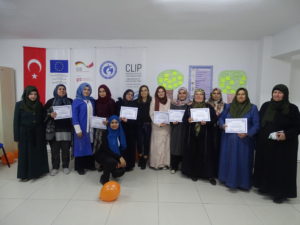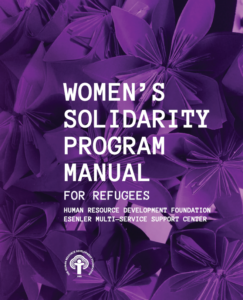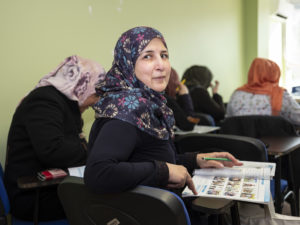Community Centres and Local Initiatives Project (CLIP) in Turkey
Context and initiative
Turkey is one of the signatory countries of the Council of Europe Convention on preventing and combating violence against women and domestic violence (Istanbul Convention). Refugee and migrant women and children accounting to 70% of the almost 4 million Syrian refugees hosted by Turkey face unique challenges and risk of discrimination. In a first-of-its-kind cooperation between EU Humanitarian Aid and BMZ Transitional Development Assistance, GIZ implements in 2019 and 2020 a multi-donor action aiming at “improving the access to and provision of services for particularly vulnerable and at-risk persons through localised assistance interventions”.
Gender – a quality feature of our work
CLIP organises capacity building on gender and protection and guarantees that all implementing partners have a sound understanding of gender equality. One of them, the Human Resource Development Foundation, has compiled and published the Women’s Solidarity Program Manual. CLIP ensures that community centres (CC) and local initiatives receiving technical and financial support from the project are open to anybody – regardless of gender, sexual orientation or gender identity, origin, religion or age. For quality assurance CLIP’s gender approach is structured around five pillars:
- Analysis: The selection criteria of implementing partners include checking their capacity and approach to gender equality, the gender equality measures they implement and their target beneficiary groups;
- Equal access to and benefits from the centre’s services, based on the gender-differentiated needs assessment;
- Equal leadership and participation in decision making, including in design, implementation and evaluation of CC activities;
- Humanitarian-development peace nexus approach: CCs respond to gender-based protection concerns, especially sexual and gender-based violence, early marriage and exploitation as well as to promote transformative discussions on gender roles.
- Localization: CLIP implementing partners conduct awareness raising and information sessions with mukhtars, community leaders and religious officers. Since the local actors can reach out to communities which the Community Centres might not be able to reach, their involvement can create a multiplier effect on the promotion of the gender equality.
Gender Impact
Between October 2017 and November 2019, the supported CCs reached more than 160.000 beneficiaries including almost 18.000 vulnerable and at-risk groups such as LGBTI, single mothers, victims of human trafficking, etc. According to latest surveys, the most commonly cited services/activities that contributed to gender equality and empowerment of women were through psychological support (62.5%), gender-specific programming (56.3%), vocational and skill training (50%), registration and legal support (43.8%), and employment support (18.8%). The same report showed that slightly over 90% of women rated the quality of services as very good or somewhat good and more than 87% of women participants of the survey mentioned that the services, they benefit from are very useful or somewhat useful.
Contact:
Kristina Willebrand-Bıyık

 GIZ Gender Website
GIZ Gender Website

